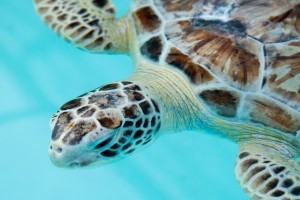
Stranding Investigations
The Stranding Investigations Program (SIP) provides 24-hour response to sick, injured and deceased marine mammals & sea turtles.
1600 Ken Thompson Parkway
Sarasota, FL 34236
Ph: (941) 388-4441
Hours: 10AM - 5PM
A 501(c)3 nonprofit organization.
Stony coral tissue loss disease is one of the most serious challenges affecting the Florida Reef Tract and certain Caribbean coral reefs. Mote Marine Laboratory's Dr. Erinn Muller is a leader within the massive collaboration to study and address this ecological emergency. Hear from Dr. Muller and colleagues in this video released in 2020 by OceanX, and read about Dr. Muller's Coral Health & Disease Research Program below.
Coral diseases are one of the greatest threats to reefs worldwide and outbreaks have changed the structure and function of reefs just within the last several decades. The Coral Health & Disease Program aims to understand the tripartite association among the coral host, potential pathogens, and the environment, to determine which component drives disease dynamics on coral reefs. The Program uses a wide variety of tools to answer questions about coral health and disease including field surveys, laboratory experiments, mathematical modeling, and molecular applications.
The Coral Health & Disease Program studies the causes and consequences of coral disease outbreaks, as well as the mechanisms that may promote coral health and resilience to major stressors such as temperature anomalies, disease, and ocean acidification. Previous research showed that stressed corals are more susceptible to disease than others (Muller et al. 2008). Similar to humans, when corals are stressed their immune system becomes compromised and they are more likely to get sick (i.e., the compromised-host hypothesis). In fact, using Bayesian hierarchical modeling, Muller and van Woesik (2014) showed that white pox disease on the threatened elkhorn coral, was the result of high water temperatures stressing genetically susceptible coral hosts. Current research is underway, which aims to identify why certain genotypes of both elkhorn and staghorn coral are more resistant to disease than others.
Physiological resistance to stress, and thus diseases, may be a result of an immune competent coral, antibiotic producing bacteria within the coral mucus and tissue, or even from health conveyed by zooxanthellae, the algal symbiont. The Coral Health & Disease Program studies several components of the coral holobiont, to truly understand the mechanisms leading to coral health and disease susceptibility. The Program collaborates with experts in the field of coral immunity and gene expression research. Next generation DNA sequencing is being used to characterize the bacterial communities of both disease resistant and disease susceptible corals, and molecular techniques are also employed to identify the symbiotic algae residing with these corals.
Research with the Program also identifies areas of disease hotspots with reefs, as well as associated areas of disease resistance, to better understand the spatial and temporal dynamics of diseases on reefs today. Several methods to prevent within colony and among colony disease transmission are also being tested in the field. To date, most studies have shown that many Caribbean coral diseases do not follow a contagious disease model, again supporting the compromised-host hypothesis (Muller and van Woesik 2012, Muller and van Woesik 2014, Randall et al. 2014).
Mote Aquarium is likely to be busy this week, with many timed-ticket entry slots selling out. Please purchase your tickets in advance to guarantee entry.
Mote Aquarium is open seven days a week at our normal hours, 9:30 a.m.–5 p.m. We hope to SEA you soon!